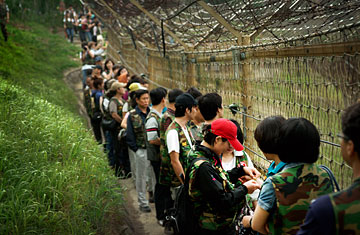
South Korean employees visit the border of the demilitarized zone, in Yeoncheon, South Korea, on a company-sponsored trip on June 2, 2009
Park Youn Hee, a 27-year-old in Seoul who is about to enter graduate school, remembers well the rush of hope that overcame her nine years ago during the first summit between North and South Korea. As she watched then South Korean President Kim Dae Jung and North Korea's paramount leader Kim Jong Il shake hands in Pyongyang on television, Park believed the Cold War conflict on the Korean peninsula might finally come to an end. "We all thought that something was going to change right away," she recalls.
But today, her hopes have been dashed. Pyongyang's continued hostility towards South Korea has soured Park on the idea that engagement can resolve the six-decade conflict between the two Koreas, and left her feeling resentful towards her northern neighbor. "I feel like we've again been stabbed in the back," Park laments. (See pictures of North Korea's rubber-stamp elections.)
Many South Koreans feel the same way. In recent years, Seoul has tried just about everything — from hard-line demands to generous food and fertilizer aid — to convince the isolated regime to end its controversial nuclear-weapons program and improve ties with its southern neighbor. But relations between the two Koreas have remained more or less unchanged. The stalemate on the peninsula that began after the Korean War of the early 1950s continues, with Pyongyang still regularly hurling threats and insults at the South. The North's stubbornness has left South Koreans feeling helpless and uncertain about what an effective North Korean policy might be. "We can't solve [the North-South conflict] with aid, we can't do it with a hard-line policy," complains Ryu Myung Ham, a 27-year-old Seoul office worker. "I don't think there's much we can do." (See pictures of North Korea's secrets and lies at LIFE.com.)
That kind of frustration has only intensified in recent days as tensions on the peninsula have escalated. In late May, Pyongyang earned global condemnation by undertaking a second nuclear test, and now Kim Jong Il may be preparing another test of a long-range missile. Seoul's response to Pyongyang's actions has been unusually tough. After the nuclear test, South Korean President Lee Myung Bak agreed to join a U.S.-led effort to crack down on the proliferation of weapons of mass destruction. North Korea called Lee's decision tantamount to a declaration of war. "Many [South Koreans] now feel that the North has taken it too far," says Yoo Ho Yeol, a professor of North Korean studies at Korea University in Seoul. "They are feeling that there is only so much they can do, realistically, and are therefore experiencing a sense of great frustration and even, perhaps, the North Korea blues." (See pictures of the rise of Kim Jong Il.)
Some South Koreans place at least part of the blame for the deteriorating North-South relationship on their own conservative President. Lee's two predecessors pursued an agenda of engagement with Pyongyang called the "sunshine policy," in which Seoul gave North Korea aid and investment — including the development of an industrial park just north of the border — in the hopes of defusing tensions. The "sunshine policy" produced two North-South summits — in 2000 and 2007 — but Pyongyang offered Seoul no meaningful concessions in return for its help. Upon taking office last year, Lee changed course and linked further economic cooperation to the dismantlement of North Korea's nuclear program. Some in the South believe Lee has to change his hard-line stand to reduce the rising tensions. "For the past years, we had built up some sort of a relationship" with North Korea, says homemaker So Young Soon, 51. "But this administration I think has failed to negotiate with the North."
But many in South Korea have become more wary of engaging the North, and more dubious of the results it might produce. "For the past 10 years, we've been giving them things and now that they're not getting it, they're acting up," says Youn Bong Sug, 57. "If we give, they should know how to be grateful. The nature of those people is rotten." Some in Seoul have become annoyed that Pyongyang continued to spend money on its weapons programs even as South Korea donated large amounts of fertilizer and food to its much poorer Northern brethren. "What we're unhappy with is the fact that even if we send them aid, they don't use it for their people and instead spend everything on buying weapons," complains Kim Chang Bok, a 76-year-old retiree. "Seeing what they've done, I don't think we need to send aid." Even South Koreans who would like to see their government change its policy and provide financial support to the North still don't want to return to the old "sunshine policy" days of one-way concessions. They increasingly expect North Korea to reciprocate. "The North just keeps on demanding, but the other side has to give something back, right?" says Lim Chaery, a 22-year-old university student. North Korea "is like a whining baby, and there's only so much you can tolerate."
If such sentiment holds, it is unlikely that North Korea's saber-rattling will scare Seoul into making new concessions or opening the aid spigot anytime soon. For now, frustrated South Koreans seem content to wait until North Korea shows some signs it is more willing to cooperate. Kim Jong Il "is like a frog in a well living in his own world," complains Kim, the retiree. "If he opens up, the North Koreans would be better off, and we would be better off, too, but he doesn't seem to understand that." Until he does, the conflict on the Korean peninsula will remain as it has for so long — stuck in time.
